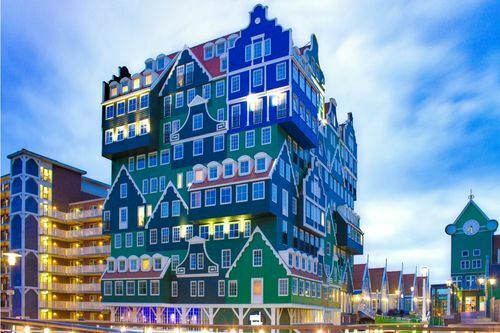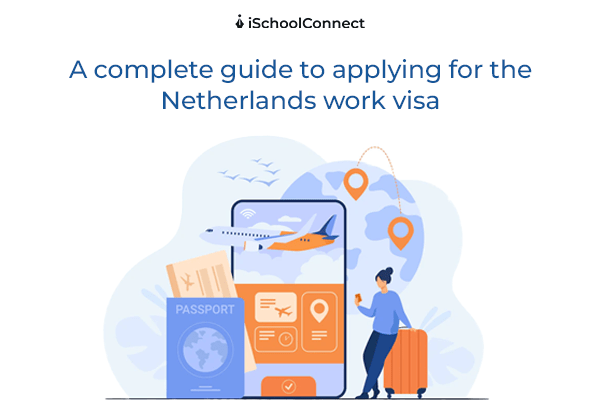Table of Contents
Netherlands job seeker visa
Amidst the picturesque landscapes and dynamic culture of the Netherlands, a fascinating trend is emerging – the desire for a ‘healthy working life.’ While Dutch individuals find genuine enjoyment in their work, they are increasingly prioritizing work-life balance, making seeking employment in this vibrant country a wise decision. Boasting a population of 17 million, a thriving economy, and one of the world’s highest qualities of life, the Netherlands beckons with promising opportunities. Embrace this enriching lifestyle and attain your dream work-life equilibrium by obtaining a Netherlands work visa.
Why should you work in the Netherlands?
Work-life balance
The Netherlands is well-known for its laid-back attitude toward work. Apart from the flat landscape and scenic beauty that makes biking to work a lot more enjoyable, the Dutch have a high quality of life, with more than half the people working part-time.
Standard of living

The Netherlands is one of the best places in the world, with a high life expectancy, good water quality, and education. According to the OECD, Dutch people have significantly higher levels of life satisfaction than the global average, thanks to above-average career and income opportunities, housing, education, health, and environmental standards.
Culture
The fantastic Dutch history is high on the list of reasons to work in the Netherlands. Beautiful historic buildings, canals, gardens, parks, and must-see museums and galleries can be found in the Netherlands. More than 15 million tourists visit the Netherlands for its culture every year.
Growing industries
The Dutch economy is one of the most stable and prosperous in the European Union. This, combined with an appealing taxation system and a central location in Europe, has made the Netherlands incredibly alluring to international corporations.
Here are four easy steps on how to get Netherlands work visa?
Step 1 | Choose the type of work visa in the Netherlands
The Netherlands has many work permits, which include
GVVA or single permit
Individuals who want to work in the Netherlands should apply for the tewerkstellingsvergunning, or TWV, which combines work and residence permits. It includes a Dutch residence permit and proof that the employee is a foreign national with authorization to work in the Netherlands.
Highly skilled migrant scheme
With this permit, you can bring talented individuals from other countries to the Netherlands and train them. Hire skilled foreign talent without demonstrating that no Dutch or EU candidates were available.
Orientation year (zoekjaar) permits ex-pat graduates
This permit is for foreigners who have completed a master’s or doctoral degree at one of the world’s top 150 universities within the last three years.
Search year permit (zoekjaar) for Netherlands graduates
This permit is only available to students who have graduated from Dutch universities. They can stay in the Netherlands for a year while looking for work as a highly skilled migrant under a residence permit.
Entrepreneur permit
Individuals who want to come to the Netherlands and establish their own business can apply for a self-employment residence permit. They must meet specific business or profession-related requirements.
EU Blue Card
Third-country nationals in the EU can obtain this residence permit to work in highly qualified positions. EU Blue Cards require a valid work contract or job offer for at least one year that meets the minimum salary requirements.
Step 2 | Netherlands work visa requirements

The requirements for a working visa in the Netherlands vary depending on the type of visa and the country of origin. They will generally require a work permit, a residence permit, or the GVVA option. All applications must be submitted in English, Dutch, German, or French to the Immigration and Naturalization Service (IND). Because the process is complicated and confusing, working with a professional with local knowledge of submitting work visas is ideal.
Other prerequisites include-
- A valid passport or another form of identification.
- No previous criminal history
- Evidence that the information provided in the application is correct.
- A tuberculosis medical test.
- Earning a sufficient income.
- Dutch government officials must recognize the employer.
- Remember that if the employees are EU or EEA citizens, they do not require any special documentation. They only need a passport or ID card to live and work in the country.
Step 3 | Application process
All applicants must apply for a visa at their home country’s Dutch mission, embassy, or consulate. If that is not possible, they can get in touch with a Dutch mission in another country. Everyone must make an appointment to submit their visa application and bring all necessary documentation. When the application is approved, the Dutch mission will stamp the employee’s passport with a visa sticker.
As employees must apply for a visa before traveling to the Netherlands, we advise them to book but not pay for their trip until they receive the necessary confirmation.
Step 4 | Other important prerequisites
Employees must make an appointment with the local city office within five days of arriving in the Netherlands. They will be assigned a Dutch citizens service number by the office. Without this number, they will be working and living in the country illegally, which could harm the employer’s business.
Key takeaways
- The Netherlands is known to have a high standard of living with a great work-life balance.
- A valid work contract for one year is a must for anyone who wants to apply for an EU Blue card.
- According to the OECD, Dutch people have significantly higher levels of life satisfaction than the global average.
If you found this blog informative, please share your views below. Click here to contact us for information on the Netherlands work visa.
Liked this blog? Read next: Top places to visit in the Netherlands | Beauty at its best!
FAQs
Q1. Which jobs are in demand in the Netherlands?
Answer- The Netherlands has a high demand for engineering, health, and public services.
Q2. What is the spoken language of the Netherlands?
Answer- Dutch is the spoken language of the Netherlands.
Q3. What is the cost of living in the Netherlands?
Answer- The cost of living in the Netherlands is around 800-1000 EUR per month.





